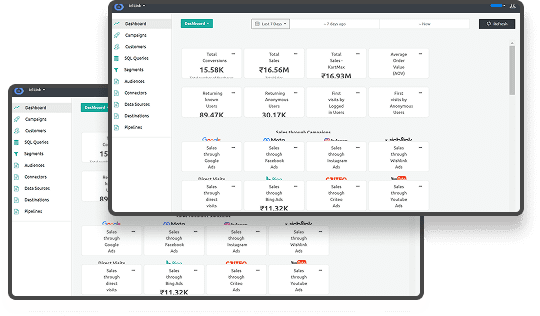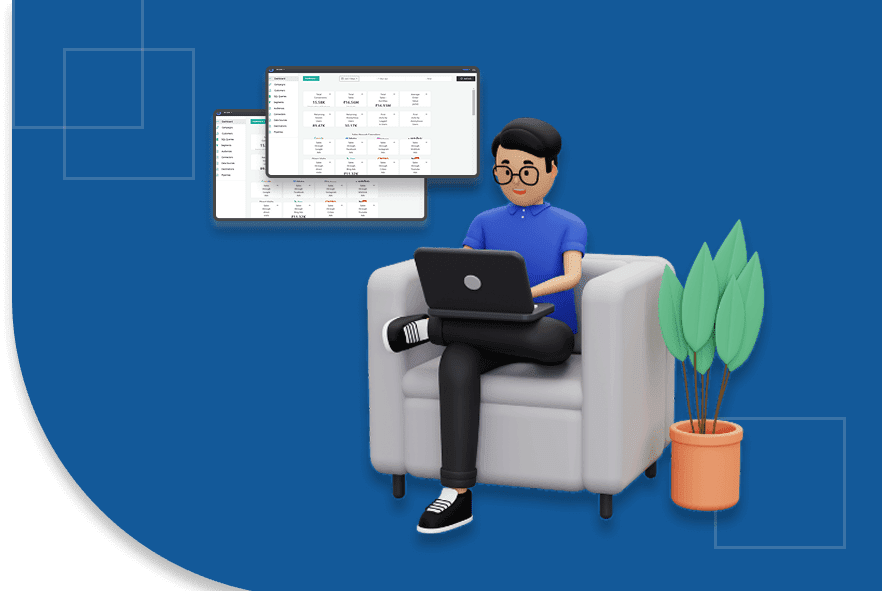In the era of increasing data privacy concerns, safeguarding personal information is a critical responsibility. Brazil’s LGPD sets clear rules on how businesses must handle personal information. Understanding these regulations is crucial for ensuring compliance and maintaining customer trust.
What is LGPD?
Brazil 's Lei Geral de Proteção de Dados (LGPD) is a landmark data privacy law. If your business handles personal data from Brazilian citizens, LGPD compliance is critical. This law establishes guidelines for collecting, processing, and storing personal information. For businesses operating in data-driven sectors like digital marketing or e-commerce, understanding LGPD is essential to maintaining customer trust and staying within legal bounds.
Date of its Effect and Enforcement:
- LGPD came into effect on September 18, 2020, but its enforcement began on August 1, 2021.
- It is enforced by the National Data Protection Authority (ANPD).
- It aims to protect personal data and ensure individuals’ rights over their information.
- This includes businesses using digital advertising or marketing tools that track user behavior.
Let’s Compare: GDPR vs LGPD:
- The LGPD shares similarities with the European Union’s GDPR but adapts to Brazil’s legal and cultural landscape.
- One of the key differences between LGPD and GDPR is the role of enforcement. LGPD is enforced by the National Data Protection Authority (ANPD), while GDPR operates under supervisory authorities in each EU member state.
- LGPD also offers flexibility by allowing businesses to tailor their compliance measures based on the size of the data processing operation.
What is the actual purpose of LGPD?
The primary purpose of LGPD is to give individuals control over their personal information and ensure businesses handle it responsibly. If your company collects or processes personal data in Brazil, LGPD applies, regardless of where your business is located.
Let’s kick start our learning by understanding the key definitions of LGPD next.
Key Definitions of LGPD:
The LGPD introduces several key terms that are essential for understanding compliance requirements.
Avijit Paul from says in his LinkedIn post,
“The LGPD is not the first or only data privacy law in South America, but it is perhaps the best publicized one from that region.”
These definitions clarify how data should be handled and help your business stay compliant. Let’s break down the most important terms in the LGPD that you’ll need to know.
- Personal Data:
Personal data refers to any information that identifies or can identify an individual. This includes names, addresses, emails, and even IP addresses.
- Sensitive Personal Data:
Sensitive data includes information about a person’s race, religion, political views, health, or sexual orientation. Handling this type of data requires stricter safeguards under LGPD.
Under the LGPD, sensitive personal data requires extra safeguards to ensure compliance and ethical handling.
Learn more about how Ingest Labs aligns its operations with ethical data practices and privacy regulations.
- Data Subject:
The data subject is the individual whose personal data is being collected or processed. They hold rights over their data, including access, correction, and deletion.
- Controller:
The controller is the entity or individual responsible for making decisions about data processing. If your business decides how and why data is processed, you are the controller.
- Operator:
The operator is the entity or individual that processes data on behalf of the controller. This role often involves service providers handling data under the controller’s instructions.
- Processing Activities:
Processing includes any operation carried out on personal data. This can range from collecting and storing to modifying and sharing data.
- Anonymization:
Anonymization is the process of removing personal identifiers from data. This ensures that the data subject cannot be identified, even indirectly.
- Consent:
Consent is the data subject's agreement for their personal data to be processed. LGPD requires clear, informed consent for many types of data processing activities.
Now you know about the terms which will help you align your data practices with LGPD requirements.
In the next section, let’s explore how LGPD applies to different business operations and its extraterritorial reach.
How LGPD Impacts Your Business: Scope and Applicability
The LGPD applies to businesses that collect, process or store personal data in Brazil. Its scope extends beyond just Brazilian companies, affecting international businesses that handle Brazilian data. This section outlines the conditions under which the LGPD applies and when exceptions may occur.
- Application Criteria (Article 3):
The LGPD applies if:
- Personal data is processed in Brazil.
- The processing activity aims to offer goods or services to individuals in Brazil.
- Personal data of individuals located in Brazil is collected or processed.
- Extraterritoriality Component:
- Even if your business operates outside of Brazil, LGPD applies if you process data from individuals located in Brazil. This is especially relevant for businesses using digital tools for advertising, marketing, or data analysis.
- Exceptions (Article 4):
LGPD does not apply in the following cases:
- Data is used for purely personal purposes.
- Data is used for journalism, academic research, or public safety.
- Data is anonymized, meaning it can’t identify the individual.
Being aware of the scope of LGPD helps you determine whether your business must comply.
Now, Let’s get into the specific rights granted to data subjects under this law.
What are LGPD’s Data Subject Rights?
Under the LGPD, individuals have specific rights over their personal data. These rights empower data subjects to control how their information is used, ensuring transparency and trust in data processing.
Here are the key rights you should know, especially when your business deals with data in Brazil.
- Right to Confirm Processing:
Individuals can request confirmation that their data is being processed. This helps them understand what information you hold.
- Right to Access Personal Data:
Data subjects have the right to access their personal data. They can request details on how and why their data is being used.
- Right to Correct Data:
If personal data is inaccurate or incomplete, individuals can request corrections to ensure accuracy.
- Right to Anonymize, Block, or Delete Data:
Under LGPD, data subjects can ask for data to be anonymized, blocked, or deleted. This often applies when the data is no longer necessary.
- Right to Data Portability:
Individuals have the right to transfer their data between service providers. This must happen in a structured, machine-readable format.
- Right to Deletion:
Data subjects can request the deletion of their personal data. This is particularly important if the data was collected based on consent and that consent is withdrawn.
- Right to Information on Data Sharing:
Individuals can ask for information on whether their data has been shared with third parties and for what purpose.
- Right to Revoke Consent:
Consent can be revoked at any time. If the data subject no longer agrees to the processing of their data, they can withdraw consent.
Now that you’re aware of the rights, let’s explore the legal bases for data processing under LGPD and what conditions must be met for each.
Legal Bases for Data Processing
Under the LGPD, data processing requires a legal basis. These legal bases provide the framework for how and why your business can process personal data. Understanding these conditions is crucial to ensure compliance with the law. Let’s read about each.
- Consent
Consent is a key legal basis under LGPD. Individuals must provide clear, informed consent for data processing. Consent must be freely given and can be withdrawn at any time.
- Legitimate Interests
If processing is necessary for legitimate business interests, this can serve as a legal basis. However, you must ensure that these interests don’t override the rights of the data subject.
- Legal Obligation
Processing can be lawful if it is required to comply with a legal obligation. This applies when laws mandate certain data to be processed for compliance purposes.
- Contractual Obligation
If the data processing is necessary to fulfill a contract, it is legally justified. This typically applies when you need personal data to deliver goods or services.
- Protection of Life
In cases where data processing is needed to protect someone's life or health, this legal basis applies. For instance, this could be used in medical emergencies.
- Health Protection
Processing is allowed when it is necessary for health-related reasons, such as public health protection or medical treatments.
- Public Interest
Data can be processed for reasons of public interest, especially when it aligns with government functions, such as law enforcement.
- Exercise of Rights
Processing is lawful when it is required for the exercise of legal rights in a judicial or administrative context.
- Research Purposes
Data processing can be done for research or academic purposes. This applies to scientific, historical, or statistical research under strict safeguards.
- Credit Protection
Processing is allowed when necessary for credit protection, ensuring lawful operations related to financial matters.
Moving on, let’s explore the principles that guide personal data processing and how they impact your business operations.
Principles of Personal Data Processing:
The LGPD outlines key principles that businesses must follow when processing personal data. These principles ensure that data is handled lawfully, transparently, and securely.
Daniel Nusbaum from Safeguard Global says in his LinkedIn post,
“The LGPD's main objective is to protect the personal data of each individual in Brazil without preventing social and economic development.”
Let's break down these essential guidelines that can shape your data management practices.
- Purpose:
Data must be processed for a legitimate, specific, and transparent reason. You must clearly state why you are collecting data.
- Adequacy:
The data you collect should be relevant and proportional to the purpose. You should only gather the data necessary for the intended use.
- Necessity:
Only process the minimum amount of data needed. Avoid collecting excessive or unnecessary information.
- Free Access:
Individuals have the right to access their personal data. You must provide them with free access to view how their data is being processed.
- Data Quality:
Ensure the data you collect is accurate and up-to-date. This reduces the risk of errors and helps maintain trust with your customers.
Maintaining high data quality is critical under the LGPD to ensure accurate and reliable decision-making.
Discover how Ingest Labs helps businesses optimize their data for better eCommerce conversions.
- Transparency:
Always be clear about how you are using personal data. Your data practices must be open and understandable to the data subject.
- Security:
Data must be protected against unauthorized access, loss, or destruction. You are responsible for implementing proper security measures.
- Prevention:
Take proactive steps to prevent damage or misuse of personal data. This principle focuses on risk management in your data handling practices.
- Non-discrimination:
You must not process data in a way that leads to discrimination. This applies to processing based on sensitive personal data like race or religion.
- Accountability:
Your business is responsible for proving compliance with LGPD. Keep detailed records of your data processing activities to demonstrate compliance.
These principles guide your approach to data processing and help ensure that you comply with LGPD standards.
Now, let’s explore the obligations of data controllers and how they impact your business.
According to LGPD, what are the Data Controllers' Obligations?
Under the LGPD, data controllers have several obligations to ensure data is processed lawfully and transparently. These responsibilities are essential to protect personal data and maintain trust with individuals. Let's read about them.
- Establishing a Clear Purpose:
As a data controller, you must define a clear and legitimate reason for collecting personal data. This purpose must align with LGPD guidelines.
- Data Minimization:
Only collect the data necessary to achieve your stated purpose. Avoid processing excessive or irrelevant information.
- Secure Data Handling:
You are responsible for ensuring data security. This includes implementing measures to prevent unauthorized access or data breaches.
- Transparency with Data Subjects:
Maintain transparency by informing data subjects about how their data will be processed. This builds trust and ensures compliance with the LGPD.
- Appointment of Data Protection Officer (DPO):
If your company processes large amounts of data, you must appoint a Data Protection Officer (DPO). The DPO ensures LGPD compliance and handles communication with the data protection authority.
- Conditions for International Data Transfers:
When transferring data internationally, ensure that the recipient country has adequate data protection standards. This is critical when working with global platforms or external vendors.
- Reporting Data Breaches:
You must report data breaches to the ANPD within a reasonable time frame. Inform affected individuals and take immediate steps to mitigate any damage.
Meeting these obligations helps keep your business aligned with LGPD standards.
Let’s now conclude with the importance of compliance and future considerations for businesses under LGPD.
Conclusion
Compliance with the LGPD is essential for businesses handling personal data in Brazil. Understanding its key principles, data subject rights, and obligations for data controllers will help you stay within legal boundaries. By following the law, you not only avoid penalties but also build trust with your audience by protecting their personal information.
Ingest Labs offers brands an easy to use interface to comply with LGPD in matter of hours. From managing consent to ensuring secure data handling, our platform helps you stay compliant while streamlining your operations. To learn more about how Ingest Labs can support your business, contact us today for a personalized consultation.
As businesses continue to navigate evolving data privacy laws, staying informed and proactive is crucial to long-term success.






